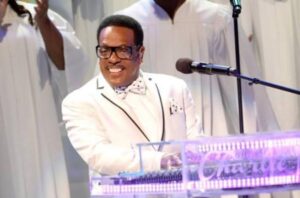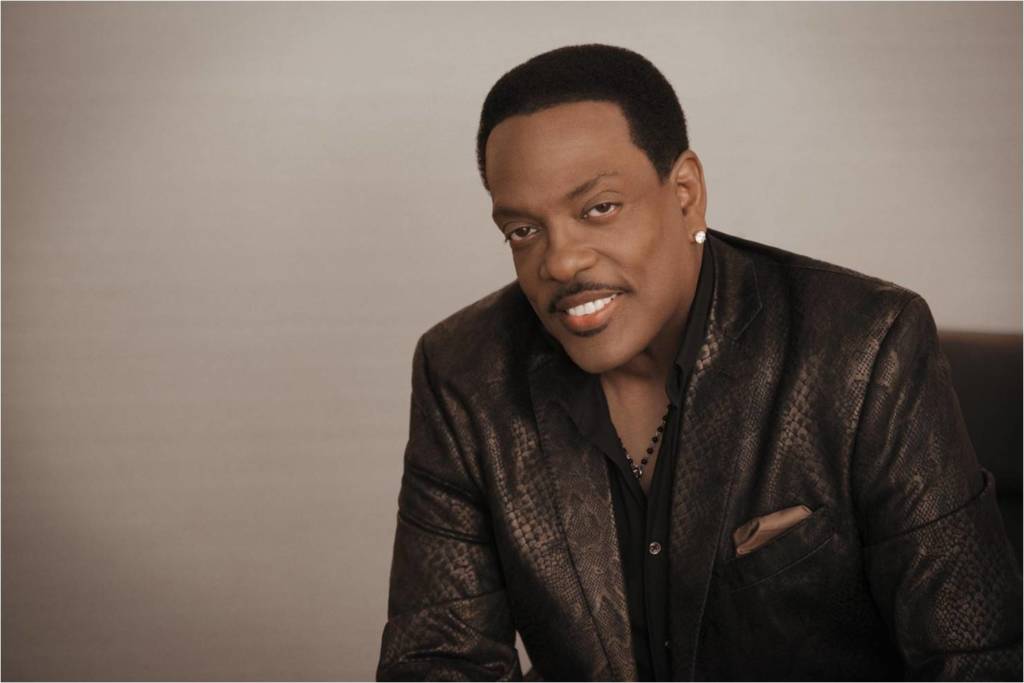by KMJQ | BlackDoctor.org
Legendary singer Charlie Wilson is the definition of a comback story. He’s now able to see his name on the Hollywood Walk of Fame after singing lead in the Gap Band alongside his brothers Ronnie and Robert with a long string of R&B hits in the ’70s and ’80s. From “Yearning for Your Love”, “Burn Rubber (Why You Wanna Hurt Me)”, “Humpin’”,”Early in the Morning”, “You Dropped a Bomb on Me”, and “Outstanding”, the hits just kept coming.
Yet even after the hardships, Wilson’s career entered a new chapter in the 90’s. First, he was a featured vocalist on records by a new generation of hip-hop artists, and then as a full-fledged solo star. He has received 13 Grammy nominations, a Soul Train Icon award, a BET Lifetime Achievement award and has a dozen No. 1 singles on the Urban AC charts. From homelessness to drug abuse and prostate cancer, the man has bounced back from them all–even better!
“I was diagnosed with cancer in 2008 but I am now cancer-free…” shares Wilson. “Once I received a national platform I wanted to speak in the communities about having this conversation in your home.”
“People really don’t know how I laid in the streets,” Wilson said. “From that to this, I cried when they told me I had a Grammy nomination. It still doesn’t seem real to me, because so many doors have been shut on me so many times. … Everything was derailed.”
How He Got on Drugs and Became Homeless
Wilson says the Gap Band hit a roadblock in 1986 when they asked to split their publishing deal with their manager; Wilson claims the manager dropped them and then had them blackballed in the industry, threatening anyone who tried to sign them since the group was still under contract with him.
“I couldn’t bounce back from that,” he said. “Everywhere we went, he ran interference. He threatened people. It was a sad situation. Drugs came a lot more. My brothers and I weren’t getting along that well.”
Slow cash flow and a cocaine and alcohol addiction drove Wilson to become homeless, as he slept in the alleys of Los Angeles’ famed Hollywood Boulevard between 1993 and 1995.
But Wilson says that it was only by God’s grace and mercy that he is here now to tell the story. For God sent him his wife in the form of a social worker to helping him past his prostate cancer, “God is a healer,” Charlie states.
It was a cousin that he used to get high with who tracked him down and started him on the path to recovery.”She was just crying so, so bad and she just hugged me for, you know, at least thirty seconds and she wouldn’t let go,” Wilson recalls. “And then when she let go she looked at me and she said, ‘Cuz, you dyin’ out here.’ I was like, ‘I ain’t dyin’!’ and she took out a mirror and showed me myself. I was like, whoa, who the hell is that? And I looked so bad, my skin was all patchy and dry and I’m a grown man and I was weighing a hundred and fifteen pounds.”
Wilson was sick and tired of being sick and tired and didn’t resist when his cousin put him in rehab. While in rehab, his social worker was his angel. “She said, ‘I’ll help you. I won’t let your feet hit the ground.’ She got me a house, filled it up with furniture, everything, man. This woman I didn’t know from Adam.”
When he graduated from the program, that woman became his wife. Wilson and Mahin Tat have been married 30 years this year.
 Charlie Found He had Cancer in a Weird Way
Charlie Found He had Cancer in a Weird Way
In his own words, the 71-year-old Charlie recounts when and how he found out about the cancer:
“Everything was just going great until I went to the doctor for a general physical in the summer of 2008.
“My wife, Mahin, made an appointment for me to have my annual physical. I have never liked going to the doctor or getting any type of exam. In addition to the physical, Mahin suggested I have a prostate exam.
“I definitely did not want to have that – for various reasons – but Mahin was very convincing,” confesses Charlie.
“After a few days, I heard back from the doctor. He encouraged me to make an appointment for the following month for additional monitoring. He explained that African-American men were more likely to be diagnosed with prostate cancer than any other race, and he wanted to keep an eye on things.
“I returned in a month. Based on follow-up tests, my doctor suggested that I see a specialist for a biopsy. I immediately got nervous and was concerned about what this could possibly mean.
“I remember hearing I had prostate cancer like it was yesterday. I was convinced my life was over. I worked hard at overcoming other life challenges and had the will to return to the top of my game in the music business. I put together a good show; had a catalog of great new songs to record and perform, etc. But now this?!”
“Our visit with the specialist started with, “I have some good news and some bad news.” My wife asked for the bad news and the doctor said “Mr. Wilson, you have prostate cancer.” My initial reaction was to get up and leave the room. My wife calmly asked me to sit down and have the doctor give us the good news. The good news was that it had been detected early and could be effectively treated.
“Thank God for my wife and her patience and understanding. My initial thought was that my life and career were over. Nothing was further from the truth.
The doctor gave us some informational materials and our research began. We discussed options with my healthcare team and by working with them closely, I am now cancer-free.
However, my journey was not over.
During my research, I learned that African-American men are 60% more likely to be diagnosed with this disease than other races or ethnicities. It was at that time that I decided it was time for me to start informing as well as performing.
I began to talk about my prostrate cancer diagnosis in my concerts and interviews. Some men asked, “Why are you telling your personal business?” I replied, “It’s my responsibility to make my community aware of this disease and to try to overcome the fear about discussing it.”
During my own prostate cancer battle, I learned that my father was also conducting his own battle. Unfortunately, he did not tell us that he had prostate cancer. It wasn’t until I called to let him know about my diagnosis that he told me. That was a very difficult conversation for me and also confirmed my commitment to tell my story in order to make my community aware of this disease and encourage them to discuss it.
Prostate Cancer & Black Men – The Causes
When you’re told you have prostate cancer, it’s natural to wonder what may have caused the disease. But no one knows the exact causes of prostate cancer. Doctors seldom know why one man develops prostate cancer and another doesn’t.
However, research has shown that men with certain risk factors are more likely than others to develop prostate cancer. A risk factor is something that may increase the chance of getting a disease.
Studies have found the following risk factors for prostate cancer:
• Age over 65: Age is the main risk factor for prostate cancer. The chance of getting prostate cancer increases as you get older. In the United States, most men with prostate cancer are over 65. This disease is rare in men under 45.
• Family history: Your risk is higher if your father, brother, or son had prostate cancer.
• Race: Prostate cancer is more common among black men than white or Hispanic/Latino men. It’s less common among Asian/Pacific Islander and American Indian/Alaska Native men.
• Certain prostate changes: Men with cells called high-grade prostatic intraepithelial neoplasia (PIN) may be at increased risk of prostate cancer. These prostate cells look abnormal under a microscope.
• Certain genome changes: Researchers have found specific regions on certain chromosomes that are linked to the risk of prostate cancer. According to recent studies, if a man has a genetic change in one or more of these regions, the risk of prostate cancer may be increased. The risk increases with the number of genetic changes that are found.
Having a risk factor doesn’t mean that a man will develop prostate cancer. Many men who have risk factors never develop the disease. However, if you’re a Black men, it is crucial that you get tested no later than 40…just to be sure.
When asked about how he maintains his longevity in the music industry, Charlie details how it contributes from his passion to keep releasing records, staying healthy and give fans a great show!
“My band is really young so everybody has the energy level that I require. We level off at the top so if you don’t have the energy, you can’t be in my band.”
Visit the BlackDoctor.org Prostate Cancer center for more articles.


